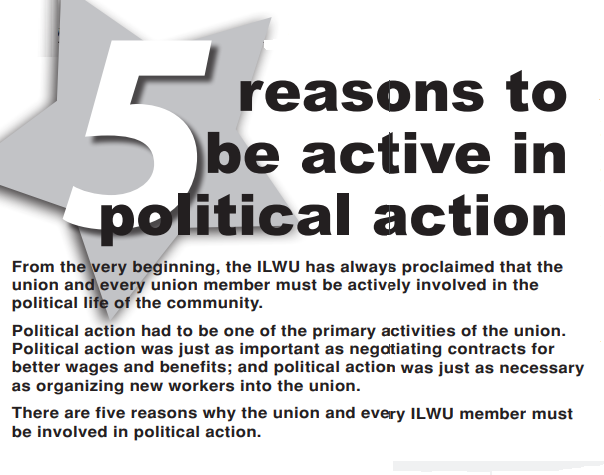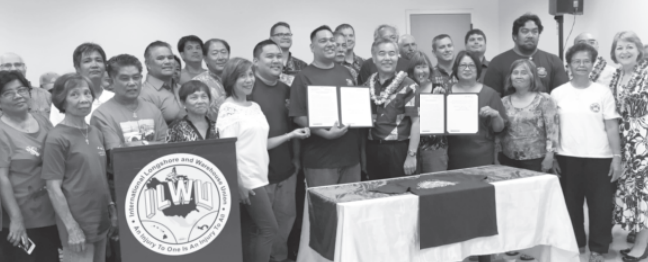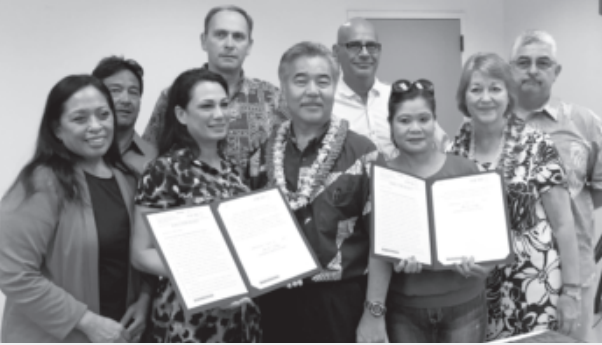When the ILWU began organizing in Hawaii, a handful of wealthy families owned the sugar and pineapple plantations and the largest companies. Individuals from these families, their attorneys, or the managers and supervisors of their companies ran for elected office as Republicans. Workers were expected to vote for Republicans and could lose their jobs if they voiced any objections or supported Democrats. In this way, big business and their wealthy owners controlled the legislature and government. They used the government and passed laws to preserve their wealth and prevent workers from organizing unions.
They passed an Unlawful Assembly and Riot Act which was used to stop union meetings. Union leaders could be arrested for conspiracy and encouraging riots. It was illegal for workers to picket a business because it interfered with commerce and threatened profits of the business owner. The police, the national guard, and the courts were used to control workers. The University was primarily an agricultural school that trained graduates to work for the plantations.
When workers are not involved in political action, they risk losing their rights.
Laws can provide benefits and extend our rights.
At the same time the ILWU was organizing sugar and pineapple workers, the union worked to elect candidates who were not connected to big business and supported a more just and democratic society. Most of these candidates identified with the Democratic Party.
In 1944, union supported candidates won 24 seats in the Territorial Legislature. In 1946, union political action elected 35 legislators and a majority in the lower house. Those elected included a number of union members who were encouraged to run for office. The Democratic majority in the legislature repealed many of the anti-labor laws and passed a law that gave agricultural workers the right to unionize. In 1954, Democrats won 55 of 76 elections, giving them a majority in the house and senate.
The plantations ran their own clinics and housing, but the population was growing and the plantations were mechanizing and cutting their workforce. The Democrats and unions shared many of the same political goals—they believed government had to change to provide the services needed by the ordinary working people of Hawaii. They built public schools, community colleges, and expanded the education programs of the University of Hawaii. They built public hospitals to take the place of the private plantation clinics. They built parks, public housing, and started programs for the elderly. They changed the tax system to equalize the burden where people with higher incomes paid higher taxes.
The Democrats, with the support of the labor movement, passed laws to give public workers the right to collective bargaining, increase the minimum wage, provide unemployment insurance, improve Workers Compensation for injured workers, require job safety, protect the environment, manage economic development, and preserve agricultural land and water resources.
The Democrats, with the support of the labor movement, passed laws to give public workers the right to collective bargaining, increase the minimum wage, provide unemployment insurance, improve Workers Compensation for injured workers, require job safety, protect the environment, manage economic development, and preserve agricultural land and water resources.
Our government has grown to serve many of the needs of working families.
Many working families are misled to believe government is bad, politicians are crooks, and taxes are too high. These ideas come from negative and deceptive propaganda put out by groups who oppose many of the goals of working families.
In reality, working people receive a lot from government. We depend on government to run our schools, take care of the health and welfare of the community, provide for public safety and emergencies, and maintain our highways, harbors, and airports. These government functions account for 85 percent of the state’s expenses.
Workers depend on government to safeguard and promote the long-term well-being of the community. This is why government regulates businesses to protect the public from contaminated and harmful products, prohibit price-fixing and deceptive business practices, require job safety, and prevent mistreatment of workers. Government regulation could have prevented the financial crisis caused by the reckless conduct of mortgage companies and banks.
Republicans oppose this expanded role of government. They want to cut public services which serve the needs of working families and they want to eliminate taxes and regulation of business. Republicans try to turn the public against government by using loaded, negative words such as “big” government, “corrupt” politicians, tax “burden”, “waste”, and “bureaucracy”. These loaded words are repeated by the media, and many voters are misled about the essential role and function of government.
Union members must educate their coworkers to support their union’s political action program and maintain needed government services to working families.

The political process enables the passage of laws that benefit the majority.
Even if every union member and their family voted for labor supported candidates, there would not be enough votes to pass good labor laws. Union members must also volunteer to help endorsed candidates win their elections in other districts.
had a strong majority of support in the legislature. Unions have to work together with like-minded groups and legislators to gain enough support to make laws. Sometimes compromises have to be made.
While the final laws are not everything labor wants, real gains are made which lays the foundation for future improvements.
There are many districts where most of the voters are not union members. Some of these legislators vote to support labor programs because they come from a working class background and believe in the same principles. In other cases, the union must work hard to educate and persuade legislators on the issues important to workers.
The union will endorse and support candidates based on their record of working with the union on labor issues. Most of the endorsed candidates are on Oahu, and many more ILWU members on Oahu are needed to help elect legislators in other districts.
Union members are needed to go houseto-house, talk to voters, make phone calls, and wave signs.
Union members increase their union’s bargaining power to pass good laws by helping union endorsed candidates in other districts.
ILWU Local 142 union political action continues year round.
Many people think their vote does not count for much and political action ends after the election. This is true when people act as individuals. When union members get involved and support their union’s political action program, this focuses and multiplies their power as working people.
The union works throughout the year to promote programs that benefit working families at all levels of government. The union watches bills that are proposed by the State Legislature, County Councils, and US Congress.
The union works to build support for good bills and defeat bad bills. This involves educating legislators on the issues and gaining their support. It involves having union members testify at public hearings or organizing members to phone and write letters to their elected representatives. It involves working together with other unions, churches, and community organizations to pass good bills.
Every ILWU unit should have a political action committee to educate members and recruit volunteers to help elect union endorsed candidates.
Governor Ige signs bills to help laid-off Maui workers
The announced closure of HC&S spurred the Legislature, with prodding from the ILWU, to take action. They passed two bills, which were signed into law on June 17 by Governor David Ige at the ILWU’s Maui Division, witnessed by almost 100 ILWU members and retirees, legislators, representatives of both HC&S and Makena Beach and Golf Resort, and State representatives, including Deputy Director Leonard Hoshijo of the Department of Labor and Industrial Relations.
After signing the bills into law, Governor Ige declared H.B. 2605 as Act 71 to provide $850,000 in funding for job training for laid-off workers on Maui and H.B. 2722 as Act 72

HC&S workers and pensioners stand with Governor Ige, who signed Act 72 into law allowing an additional 13 weeks of unemployment benefits for jobless workers on Maui.
to provide Maui dislocated workers an additional 13 weeks of unemployment benefits. Originally introduced to address the HC&S closure affecting 675 workers, the bills were amended in mid-session when Makena Resort announced its plans to close on July 1. The bills now include workers losing their jobs in all of Maui county.
The impact of HC&S closure on Maui’s economy
In his remarks, Governor Ige said the closures will impact some 2800 workers because of the ripple effect of the layoffs on the economy. One worker laid off in a mass layoff will affect three others who work for companies doing business as a vendor with the closing company or are affected by the slowdown of business because more workers are less able to make purchases in stores, go out to eat, or pay for other services. Governor Ige expressed hope that the training funds and the additional unemployment benefits would help laid-off workers make the transition to other employment. He also noted that his very first job was with Del Monte Pineapple, which made him an ILWU member for a brief time.
Sadness for the loss of sugar
House Speaker Joe Souki said his wife and he will miss the HC&S smoke stacks he now sees from his home every day. When smoke is billowing from the stacks, he knows that sugar is being processed and people are working. This will soon end. Like others, he has close ties to sugar with relatives who worked at Pahala Sugar and HC&S, and he even put in his own “hoe hana” time in earlier days. He noted the “big battle ahead” to ensure that the 36,000 acres left behind when sugar operations cease will remain in agriculture.
The face of Maui is changing
Senator Gil Keith-Agaran, who chairs the Senate Committee on Judiciary and Labor, spoke of his own family roots at HC&S. His mother, Lydia Coloma, an ILWU pensioner sat proudly in the audience among her friends retired from various ILWU houses. While he worked hard to pass the two bills, Senator Keith-Agaran said the bill-signing was “bittersweet” because of the impact of the sugar company’s closure on so many lives and the end of the plantation era. He recalls Willie Kennison, retired Maui Division Director, commenting what a joy it was to fly into Maui and see the fields of green, growing cane. But soon, those fields will no longer be green. The face of Maui is changing, he said, different than what he knew growing up.
Cooperation to aid those affected by HC&S and Makena closure
Representative Mark Nakashima, chair of the House Committee on Labor and also instrumental in passing the two bills, noted that he grew up in Honokaa and was a teacher at Honokaa High School when Hamakua Sugar closed down 20 years ago. He witnessed the impact of the closure on the families of the sugar workers and knew the importance of working with his Maui colleagues, like Rep. Angus McKelvey, who introduced H.B. 2605, and Senator Rosalyn Baker, who, along with others, introduced the companion bill in the Senate.
Governor Ige said that all levels of government have been cooperating to assist laid-off workers, particularly those from HC&S. The federal government has pushed through Trade Adjustment Assistance to HC&S workers because of foreign competition and is working on certifying a second petition. The County of Maui has worked on a task force to help the workers of HC&S find new jobs.

Makena members and Governor Ige pose with Act 71, which appropriates job training funds for laid-off workers on Maui. (L-r, front) Local 142 President Donna Domingo, Gail Manibog, Governor David Ige, Unit 2511 - Makena Beach and Golf Resort Secretary-Treasurer Josie Noguchi, Senator Roz Baker. (L-r, back) Unit 2511 Chair Ron Siliado, Business Agent Steve West, Bernard Rozet, and Division Director Steve Castro.
We are thankful
Governor Ige acknowledged the work that the ILWU did to ensure introduction and passage of the two bills, which passed unanimously in the House and had only one dissenter in the Senate. Donna Domingo, president of the ILWU, thanked the Legislature and Governor Ige for passing these laws that will give ILWU members from HC&S and Makena a helping hand toward new careers.
New possibilities
Following the bill-signing ceremony, Gail Manibog, a guest service agent at Makena Resort and a single parent of four, said she is sad that Makena, her home for the past 28 years, is closing, but she sees an opportunity with the state funding to be able to go back to school and pursue a new career in cosmetology.
Ben Wilson, who was laid off by HC&S in April, said he plans to take advantage of the additional unemployment benefits to access training that will help him get a new job that will allow him to continue to be an ILWU member. Other laid-off workers like Banny Yanos were grateful for the Legislature and the Governor ensuring that additional benefits and funding is being made available for him and his co-workers.
With these two new laws, there is opportunity and hope for the future.
